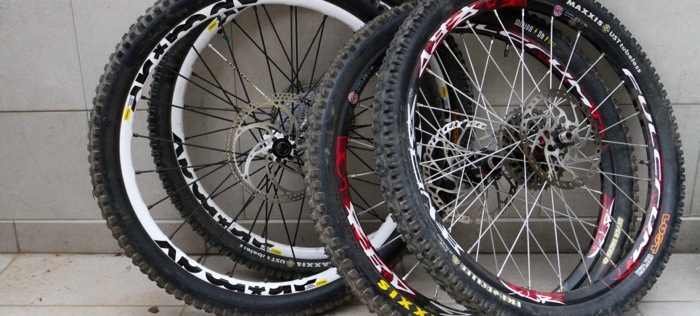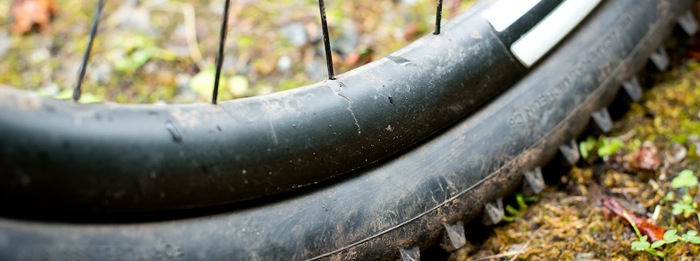
Mountain Bikes are all about durability, strength and the ability to take an absolute hammering. These same expectations apply to your wheels too. They are the first part of your bike to be placed under stress when you ride. Whether you're launching off drops, clearing your neighbour's house, or just riding down your favourite trail... your wheels are expected to perform flawlessly, as well as withstand the punishment you give them.
Given the above, it's no wonder so much thought goes into the subject when riders consider upgrading their wheels. Once you've decided why you want to upgrade, you can then consider which wheels to choose from. As is the case with most performance parts you can't win in all avenues. For example, if you choose a superlight carbon fibre XC wheel, you're admittedly sacrificing a bit of strength and structural integrity - especially if you intend mimicking your favourite Red Bull Rampage riders. The same goes in reverse; if you choose the strongest set of wheels capable of withstanding a nuclear explosion, then they're very likely to weigh substantially more...
CHOOSE CAREFULLY
When you do decide to upgrade your wheels, you will potentially be narrowing down your riding options based on what the wheel is designed for. If you go for a lightweight carbon set, you'll be mostly limited to cross country riding. If you choose super burly freeride rims, they won't make you faster on the hills!
Some options for typical trail riding that won't break the bank:Hope Hoops Pro 2 Evo, Mavic Crossmax ST, Crank Brothers Iodine 2, Shimano XT
THE 5 AREAS TO CONSIDER
1.Wheel Strength
If your riding is generally quite hard and aggressive, than the strength of your wheels is paramount. Regardless of brand, you should be able to find yourself a decent set of 'trail' wheels. This style of wheel is capable of handling the rough stuff as well as allowing you to pedal along the flats and up hills without too much hindrance.
If you tend to ride with some finesse, and the trails you ride are generally quite tame, then wheel strength is not as much of a concern as someone who suits the above description.
2.Wheel Weight
For some styles of riding, wheel weight is quite important. So important in fact, that the entire decision can be based purely on this point. A lightweight set of wheels will make your bike far more responsive, and much better at riding uphill. On the other side of the scale, a heavier wheelset is not always a bad thing. If your riding is gravity based, then extra weight isn't really a major concern as you'll be more interested in wheel strength.
3.Wheel Material
It used to be a choice between steel and aluminium, but this is the 21st Century folks! Now the choice lies between aluminium and carbon fibre. Yes, that's right... carbon fibre wheels. If you're a complete weight weenie then this will send you into shrills of ectasy! Carbon fibre wheels are substantially lighter and stiffer and are becoming increasingly popular with professional riders on the World Cup MTB circuit.
Strength and material integrity are not so much of an issue with carbon wheels, but more the resistance to rock chips and cuts. Take a look at your own wheels, and you'll see small nicks and chips on the rim surface. To carbon fibre wheels, this can eventually pose as a problem - reducing the structural integrity of the material.

4.Wheel size
This might sound stupid, but read on before having a laugh. If you're trawling through your Local Bike Shop (LBS) newsletter, and you spot some wheels on special, make sure they're the right size for your bike! Not only are mountain bike wheels now in three sizes, (26" - 27.5" - 29"), but they now also come in the old quick release, or the newer Thru Axle format. Keep in mind your axle width as well, and finally your tyre clearance when fitting your wheels to the bike. The safest thing you can do is just give your local bike shop a quick call, and ask them for advice given your circumstances.
Related article "What is the best wheel size for marathon or endurance mountain biking?"
5.Reliability
Reliability is not so much of an issue at the start of your relationship with new wheels... It's further down the track when your relationship gets rocky, right!? If you happen to need replacement parts, find out how easily these can be a acquired. If you're a bit of a home mechanic, you'll appreciate knowing whether specialist tools are required in order to remove parts such as press fit bearings, freewheel bodies or axles.
All of these factors are inclusive in the topic of reliability. Not the reliability of the actual wheel, but of the brand as a whole. If the brand is renowned for making quality wheels, they will stand by their product and offer an endless supply of spare parts. Your local store will likely have an account with the wheel importer, to be able to quickly order the required parts if the need arises.
6. But wait, there's one more: Price!
There's no point flogging a dead horse as they say. Similarly it is a bad idea to attempt mountain bike resurrection on a steed that has had its day. Spending $500 on wheels for a bike that is worth only that same amount is pointless - you are better off saving your money for a new bike. Wheels are the best upgrade you could give a bike but also you gotta' know when to call it a day.
There's more to consider than meets the eye when you choose to upgrade your wheels, purely because there are so many needs to meet. So many styles of wheels, for different styles of riding. Firstly, find out which qualities you are after, and then go about hunting down your new set of hoops. No doubt it will be an educational experience and will hopefully result in more fun on the trails - whatever you choose...


